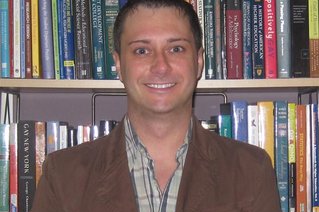According to the Gay, Lesbian and Straight Education Network, LGBT middle- and high-school students report an absence rate of more than seven times that of heterosexual students. Another sobering report: LGBT students who face frequent harassment had grade-point averages that were half a grade lower than those who were not bullied as often.
Yet, little research is available on what happens to those students once they graduate high school and continue on to college — something Kip Sorgen, a Penn State University doctoral student, is looking to change.
Sorgen, who studies at Penn State’s University Park campus in State College, has been working on his Ph.D. dissertation, “The influence of sexual identity on psychological and higher-education outcomes,” in the university’s College of Education for about a year, and expects to complete it by February.
He said the dissertation stems from the dearth of research he saw on LGBT college students.
“I noticed that there’s not a lot of research about academic outcomes for LGBT students in higher education and, in fact, I’ve only seen two studies that focus on that area,” he said. “National student surveys on student engagement or involvement on their campuses just don’t ask about sexual identity, and that’s gotten to be problematic because we can’t analyze this data and learn more about the impact of sexual identity. I want to try to close that gap in the research.”
Sorgen, an openly gay Ohio native, attained his bachelor’s degree at Ohio University and went on to work in the development office at Capital University in Columbus, a position he said motivated him to continue his education.
“I really enjoyed working with students, but at that time it was in a supervisory capacity — I ran the phone-a-thon and the senior class gift committee — and I realized I wanted to work in more of a development capacity, so I started to look around for some different programs that would allow me to do that,” he said.
Sorgen decided on the Higher Education Administration program at New York University and worked as the graduate assistant in NYU’s Office of LGBT Student Services for two years, where he said he solidified his desire to focus his studies on LGBT students.
Sorgen said he applied to Penn State for his doctorate because its higher-education program is one of the top-ranked in the country, and he was eager to work with several researchers at the institution.
Since beginning his doctoral work, he has conducted research on such topics as the changes in attitudes of undergraduates toward LGBT individuals and identity development of female-to-different-gender individuals.
This final undertaking, which will include a national survey of LGBT students, will examine how the stressors unique to these individuals impact their involvement and success on their college campuses.
“The research that has been done shows that there are differences for LGBTQ students compared to heterosexual students or when certain identities are compared with others, such as gay men and lesbians, but it needs to go a lot deeper,” Sorgen said. “What I’m focusing on is the psychological variables that might influence higher-education outcomes for LGBTQ students, like outness and internalized homophobia; I want to see how those things influence the engagement of LGBTQ students on campus. Straight students don’t have to worry about their outness and don’t have that level of homophobia regarding their identity, and they often do have the social support and self-esteem that some LGBTQ students don’t.”
Sorgen noted that the only two published reports on the experiences of LGBT college students came out within the last few years, and he attributed the slow progress in this area to a number of factors — such as the fact that only two generations of college students have lived since homosexuality was declassified as a mental disorder by the American Psychiatric Association.
His aim is to fuel further analyses of the LGBT college community, an area he plans to continue studying once he attains his doctorate.
“No one has really been looking at sexual identity as having an influence on learning, and universities in particular are very, very slow to change. I think it’s coming, but it’s not quite there yet,” he said. “Colleges and universities need to start capturing sexual identity as a demographic variable. We’re never going to completely know the size of the [LGBT campus] population because of the fluidity of sexual identity, but they’re remiss in not asking.
“I feel like this is my way of advocating for the LGBTQ community, by producing research that is beneficial to higher education, and to people who work with college students and even to those who don’t. I want to continue to produce publications, analyze data and conduct studies that benefit the LGBTQ community through advancing knowledge.”
Jen Colletta can be reached at [email protected].
